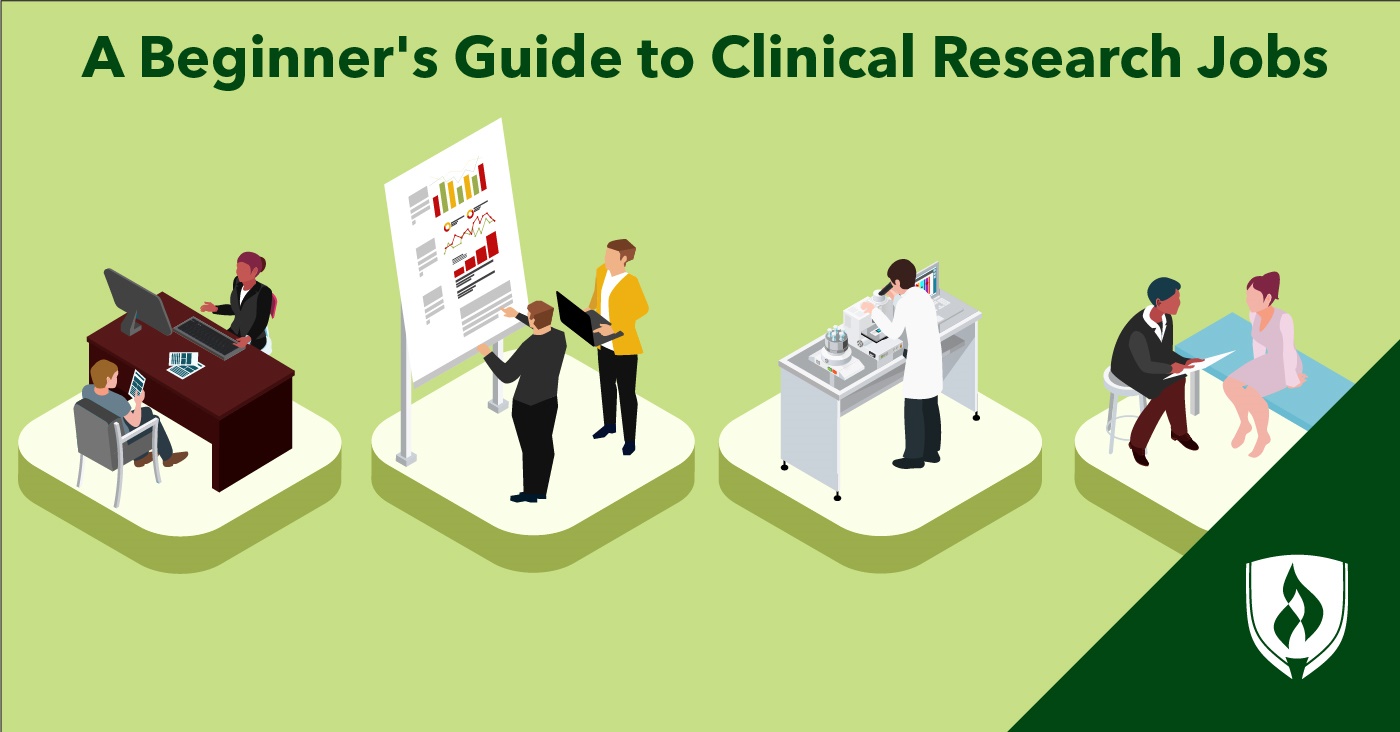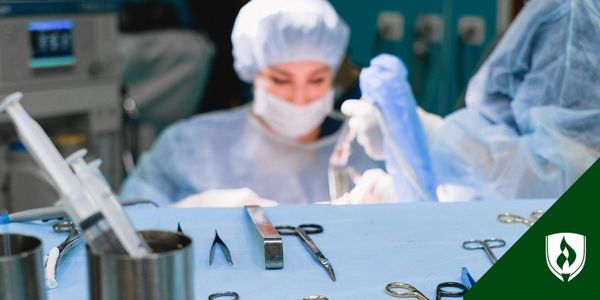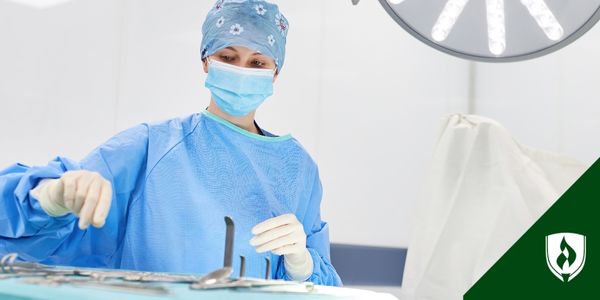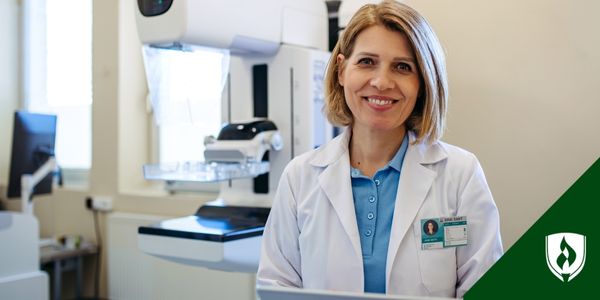
Interested in working in the field of healthcare, but not sure direct patient care is for you? A job in clinical research might be a good fit. This often-overlooked niche covers a mixture of administrative, academic and patient-facing roles, all of which are focused on the goal of improving medical knowledge, delivering new and improved treatment, and impacting health outcomes for people everywhere. Many become interested in clinical research jobs from a mixture of curiosity and the desire to help people.
“Many folks get drawn to public health research because of an experience that changed them and a desire to understand that experience,” says Andrew Genz, research program manager at Johns Hopkins Bloomberg School of Public Health.
Sound like something that could be in your future? Read on for an introduction to clinical research jobs in healthcare.
What kinds of jobs are there in clinical healthcare research?
Genz finds the diversity available in clinical research to be its most alluring aspect.
“Basically, think of any combination of ‘Health Issue’ among ‘Population’ in ‘Location,’ and there’s likely a need,” Genz explains. That can be anything from respiratory illness among senior citizens in Appalachia to kidney disease among lower income populations in the United States.
Dr. Joyvina Evans, a professor in the Master of Public Health program at Rasmussen University, offers an overview of the basic types of clinical research roles.
“Research coordinators might work in industry-sponsored clinical trials of drugs,” Dr. Evans explains. “Research associates monitor and audit such trials while research project managers oversee projects that may involve, for example, collecting samples of patients with COVID-19. Program managers focus on particular fields of research with an eye toward public health outcomes, such as diabetes care.”
“There are a lot of different people that work together to make a research job run smoothly,” says Dr. Courtney Colonna Kuza, a program manager at the Center for Pharmaceutical Policy and Prescribing at the University of Pittsburgh. “Investigators, project managers and project coordinators, research assistants and data analysts are usually the core group of people on a team.”
Dr. Colonna Kuza adds that there are also administrative roles in this field, which may not work directly in everyday research, such as Institutional Review Board (IRB) reviewers, budget specialists and research administrators.
Clinical research jobs are also available in a variety of settings. “The types of employers can be as diverse as hospitals; universities; private industry; city, state or federal agencies; or any number of non-governmental organizations,” says Genz. “Clinical researchers include statisticians, programmers, lab techs, nurses/clinicians and project managers. Many research jobs are a combination of these roles.”
Sean Marchese, an RN and oncology writer for The Mesothelioma Center, worked in a role that combined his clinical knowledge and research skills. “I worked for two years as a clinical research nurse at AdventHealth Orlando’s Translational Institute and focused on studies involving diabetes and metabolism,” Marchese explains. “One of our studies sent muscle tissue into space.”
What do people in clinical research roles do?
Clinical research coordinators work closely with a physician research investigator and have the responsibilities of recruiting patients for studies and conducting study visits.
Research coordinators handle a variety of tasks. “Obtaining vitals, distributing medication, ensuring that you receive lab work, processing labs, shipping samples,” says Dr. Evans. “There are other jobs for research coordinators that involve working on research projects that are non-clinical and may involve quality improvement initiatives.”
“If they work in a wet lab, they might run tests on samples or send them out for testing,” adds Dr. Colonna Kuza.
Data analysts are also often parts of clinical research teams. “Data analysts manage study data and know which tests to run and how to interpret the results so the rest of the team can understand them,” Dr. Colonna Kuza says. “A good statistician or data analyst is like having a magician on the team!”
Research associates work with both the investigating physician and the research coordinator, though not in a patient-facing sense. “Research associates review patient files, lab results and medications,” Dr. Evans says.
For research project and program managers, the work involves the big-picture management of an entire project or program. This includes coordinating the work of the team, managing budgets, purchasing equipment, overseeing study recruitment, and ensuring regulatory and compliance information is kept up to date—all of these duties fall within the domain of the project and program managers.
“Project managers take an administrative role,” says Dr. Colonna Kuza. “They make sure the project is hitting milestones on time and on budget, keep up regulatory approvals and other paperwork, and make sure everyone has the tools they need to do their jobs.”
What kind of educational background and training are typically involved for clinical researchers in healthcare?
An exciting feature of clinical research is the fact that the backgrounds of people who work in this field vary as much as the projects they conduct.
“Many times, there is a requirement of some form of science or clinical education: biology, chemistry, kinesiology, medical assisting, nursing, public health,” explains Dr. Evans. “It is extremely helpful to have some knowledge of biostatistics, epidemiology or research methods, and protection of human subjects.”
The levels of education also vary. Many clinical healthcare researchers have Master of Public Health (MPH) degrees.
“The MPH degree is a job-training program that prepares you for work running or supporting a clinical research study,” Genz explains. “It’s different than the Master of Science degree in that it usually ends in a capstone or practicum experience instead of a thesis.”
Other types of educational paths also can lead to work in clinical research. “Investigators virtually always have PhDs in public health, statistics or epidemiology or an MD paired with an MS or MPH,” says Dr. Colonna Kuza. “Other roles usually require an MPH or a Master’s degree in a related field, such as health administration, statistics, social work or epidemiology.”
Colonna Kuza suggests seeking out programs with courses covering research methods, statistics and data management, qualitative methods and analysis, survey design, epidemiology, grant writing, and writing for publication. For those who are interested in the data analysis side of clinical research, it can help to brush up on programming languages commonly used for statistical analysis, like R-Project and Python®.
“Good traits to acquire for clinical research include curiosity, attention to detail, organization, communication, a desire to help people and being able to work with a team,” Genz says. “Ultimately, these are more important than being able to work in six coding languages.”
In many cases, prospective clinical researchers are people interested in fields of healthcare that aren’t necessarily patient facing. In a clinical research role, you have the ability to indirectly help others by facilitating important studies gauging the safety and efficacy of new treatments or devices—things that can end up being life-changing advances. This makes the field an appealing option for those who want to help address healthcare issues without focusing solely on direct patient care.
“Some people are more interested in population health than in caring for individual patients,” Dr. Colonna Kuza explains. “Research also attracts folks who are interested in social justice issues; health care is at the intersection of many inequities, and research is an opportunity to tackle those issues and improve many lives. A day in the life of a researcher is also never the same—there are new people, new places, new problems, new settings.”
Could a clinical research role be in your future?
Now that you know a little more about these important and often under-the-radar roles in healthcare, could your future be in clinical research? While there’s no set-in-stone universal path to finding work in a clinical research role, a Master of Public Health degree can provide an excellent foundation for many.
Python is a registered trademark of the Python Software Foundation.




